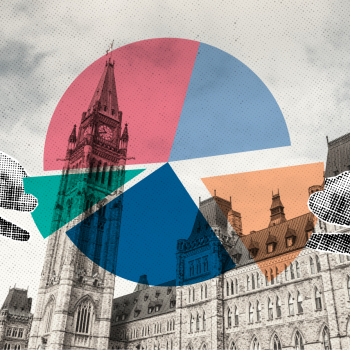CTF/FCE Overview Analysis of the 2024 Federal Budget
In Budget 2024: Fairness for Every Generation, the Government of Canada recognized affordability issues facing Canadians and sought measures to address them.
This budget is ambitious; many progressive organizations recognize the significant changes it aims to bring to the lives of Canadians. By decreasing the exemption on capital gains over $250,000 and asking the wealthiest Canadians to pay more, the federal government is slowly turning the dial on making social programming accessible for those who need it most.
In February 2024, the Canadian Teachers’ Federation (CTF/FCE) met with the Minister of Finance to outline three key priorities that we felt would make life more affordable for families living in Canada from the perspective of Canadian teachers.
The CTF/FCE is thrilled to say that those three asks, shared with the Government of Canada, have been included in Budget 2024: the introduction of a National School Food Program, increased mental health supports for young Canadians, and loan forgiveness for teachers and early childhood educators living and working in rural and remote communities.
School Food
Announced earlier this year, the federal government has committed money to a National School Food Program. This will be significant in changing the lives of children and families in Canada. The CTF/FCE will continue to monitor the developments of this exciting initiative. The federal government has already initiated communications with the CTF/FCE to discuss next steps.
Budget 2024 announces the creation of a National School Food Program, which will provide $1 billion over five years to Employment and Social Development Canada, Crown-Indigenous Relations and Northern Affairs Canada, and Indigenous Services Canada, starting in 2024-25, to work with provinces, territories, and Indigenous partners to expand access to school food programs. This includes investments for First Nations, Inuit, and Métis communities as well as Self-Governing and Modern Treaty Partners, many of whom have some of the highest rates of food insecurity in Canada.
(Page 111)
Loan Forgiveness
The federal government has stated that it intends to expand the Canada Student Loan Forgiveness Program to include both teachers and early childhood educators who work in a rural or remote area. This initiative will mean more young adults entering the profession will be willing and able to relocate to and stay in remote and rural communities. (A knock-on effect will be making Canada less focused on major urban areas, and – in turn – supporting development in small and medium sized communities across the country). We commend the federal government for listening to a direct CTF/FCE ask in recent consultations on addressing the labour shortage in rural and remote communities while also helping to alleviate, in some small way, the retention and recruitment crisis facing public education.
While we wait for more details on the eligibility, for reference, nurses qualify for $30,000 in federal student loan forgiveness when they work in a rural or remote community. As per the federal government’s definition, “under-served rural or remote community is one located outside of: metropolitan areas, areas with an urban core population of 50,000 or more, and provincial capitals”. It is the CTF/FCE’s understanding that the federal government is currently working to expand the definition of a rural/remote community to those communities under 30,000 people in population.
See more details about the current programming offered to doctors and nurses here: Canada student loan forgiveness for family doctors and nurses.
Budget 2024 announces the government’s intent to introduce amendments to the Canada Student Financial Assistance Act and the Canada Student Loans Act to permanently expand the reach of the Canada Student Loan Forgiveness Program to more health care and social services professionals working in rural and remote communities:
Dentists; Dental hygienists; Pharmacists; Midwives; Teachers; Social workers; Personal support workers; Physiotherapists; and, Psychologists.
(Page 123)
Mental Health Supports
The federal government has committed to setting up a Youth Mental Health Fund to help community health organizations provide greater access for younger Canadians and young adults to mental health resources. While the funding commitment is low, it is a good starting point. The CTF/FCE will monitor this commitment closely to see how this directly impacts students, teachers, and their families.
Budget 2024 proposes to provide $500 million over five years, starting in 2024-25, for the creation of a new Youth Mental Health Fund which will help younger Canadians access the mental health care they need.
(Page 127)
Overall, this budget is the first budget in a long-time that the CTF/FCE can confidently say delivered on our asks. It is a budget that will seek to make an improvement in the lives of Canadian teachers and their families. While there is so much work to be done on the federal and provincial/territorial level, this is a big step in the right direction.
The CTF/FCE recognizes that other organizations are doing great work, and we’d like to highlight other progressive organizations’ reaction to the 2024 federal budget:
About the CTF/FCE
Founded in 1920, the CTF/FCE is a national alliance of provincial and territorial teachers’ organizations that represent over 365,000 teachers and education workers across Canada. The CTF/FCE is also an affiliate of Education International, which represents more than 32-million educators.
Media contact
Nika Quintao, Director of Public Affairs
Canadian Teachers’ Federation (CTF/FCE)
Contact
Mobile: 613-606-7809


